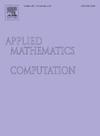基于阶跃函数的 0/1 深度神经网络递归方法
IF 3.5
2区 数学
Q1 MATHEMATICS, APPLIED
引用次数: 0
摘要
带阶跃函数激活的深度神经网络(0/1 DNNs)是深度学习中的一种基本复合模型,具有高效率和对异常值的鲁棒性。然而,由于 0/1 DNNs 模型的不连续性和缺乏子梯度信息,之前的研究主要集中在设计近似阶跃激活的连续函数和开发连续优化方法上。本文通过在 0/1 DNNs 中引入两组网络节点变量,并通过探索所得模型的复合结构,将 0/1 DNNs 分解为与阶跃函数相关的一元优化模型和与其他变量相关的三个衍生优化子问题。对于一元优化模型和两个派生优化子问题,我们提出了闭式解法;对于第三个派生优化子问题,我们提出了一种高效的近似方法。在此基础上,我们为 0/1 DNN 开发了一种基于阶跃函数的全局收敛递归方法。通过理论分析以及在 MNIST、FashionMNIST 和 Cifar10 数据集分类上的一些数值示例,验证了所提算法的效率和性能。本文章由计算机程序翻译,如有差异,请以英文原文为准。
A step function based recursion method for 0/1 deep neural networks
The deep neural network with step function activation (0/1 DNNs) is a fundamental composite model in deep learning which has high efficiency and robustness to outliers. However, due to the discontinuity and lacking subgradient information of the 0/1 DNNs model, prior researches are largely focused on designing continuous functions to approximate the step activation and developing continuous optimization methods. In this paper, by introducing two sets of network node variables into the 0/1 DNNs and by exploring the composite structure of the resulted model, the 0/1 DNNs is decomposed into a unary optimization model associated with the step function and three derivational optimization subproblems associated with the other variables. For the unary optimization model and two derivational optimization subproblems, we present a closed form solution, and for the third derivational optimization subproblem, we propose an efficient proximal method. Based on this, a globally convergent step function based recursion method for the 0/1 DNNs is developed. The efficiency and performance of the proposed algorithm are validated via theoretical analysis as well as some illustrative numerical examples on classifying MNIST, FashionMNIST and Cifar10 datasets.
求助全文
通过发布文献求助,成功后即可免费获取论文全文。
去求助
来源期刊
CiteScore
7.90
自引率
10.00%
发文量
755
审稿时长
36 days
期刊介绍:
Applied Mathematics and Computation addresses work at the interface between applied mathematics, numerical computation, and applications of systems – oriented ideas to the physical, biological, social, and behavioral sciences, and emphasizes papers of a computational nature focusing on new algorithms, their analysis and numerical results.
In addition to presenting research papers, Applied Mathematics and Computation publishes review articles and single–topics issues.

 求助内容:
求助内容: 应助结果提醒方式:
应助结果提醒方式:


